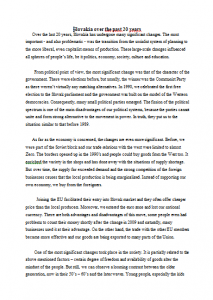Esej angličtina : Slovakia over the past 20 years
 Over the last 20 years, Slovakia has undergone many significant changes. The most important – and also problematic – was the transition from the socialist system of planning to the more liberal, even capitalist means of production. These large-scale changes influenced all spheres of people‘s life, be it politics, economy, society, culture and education.
Over the last 20 years, Slovakia has undergone many significant changes. The most important – and also problematic – was the transition from the socialist system of planning to the more liberal, even capitalist means of production. These large-scale changes influenced all spheres of people‘s life, be it politics, economy, society, culture and education.
From political point of view, the most significant change was that of the character of the government. There were elections before, but usually, the winner was the Communist Party as there weren’t virtually any matching alternatives. In 1990, we celebrated the first free election to the Slovak parliament and the government was built on the model of the Western democracies. Consequently, many small political parties emerged. The fission of the political spectrum is one of the main disadvantages of our political systems, because the parties cannot unite and form strong alternative to the movement in power. In truth, they put us to the situation similar to that before 1989.
As far as the economy is concerned, the changes are even more significant. Before, we were part of the Soviet block and our trade relations with the west were limited to almost Zero. The borders opened up in the 1990’s and people could buy goods from the West too. It enriched the variety in the shops and has done away with the situations of supply shortage. But over time, the supply far exceeded demand and the strong competition of the foreign businesses causes that the local production is being marginalized. Instead of supporting our own economy, we buy from the foreigners.

